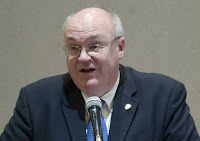A Frankfort judge has blocked the effects of one of the three laws that the state legislature passed, over Gov. Andy Beshear’s vetoes, to limit his emergency powers in the pandemic.
Franklin Circuit Judge Phillip Shepherd said the law “could likely wreak havoc with public health” by allowing businesses, schools, local governments and others to make their own rules “with no meaningful oversight or review.”
The law allows facilities to remain open as long as they have a plan that meets the guidelines of the Centers for Disease Control and Prevention or the state administration, whichever is more lenient.
Shepherd said he was concerned that the law “could create chaos and undermine any effective enforcement of public-health standards to prevent the spread of this deadly disease during this pandemic,” so he issued a restraining order against it until the issue can be briefed and argued at a full hearing.
Blocking a law with a judicial order generally requires the prevailing side to show that it has a likelihood of winning the case on the merits. Shepherd said there are “serious questions” whether the law is “void for vagueness” and is “an improper delegation of legislative power,” as Beshear’s suit argues.
Shepherd pointed to a piece of Beshear’s evidence, a letter from the CDC saying that its guidelines are only that, and are not intended to be used as regulations.
He said immediate implementation of the law “would pose a clear and present danger to public health and would undermine any effective public-health strategy to contain Covid-19.”
At a news briefing, Beshear said there are 174 CDC guidance documents that each business would need to consult. “I guess every business would have to look through all 174 of these, which multiple ones will apply to them, and try to figure out what they do or do not have to do,” he said. “We can’t defeat a virus with this,” he said, holding up a huge stack of CDC documents.
Shepherd issued
the order after a conference with attorneys. He reserved action on the other two bills challenged by Beshear.
One limits to 30 days executive orders that restrict the function of schools, businesses or nonprofits, or that regulate political, religious and social gatherings or impose mandatory quarantines or isolation requirements, unless the orders are extended by the General Assembly.
Another limits a governor’s emergency regulations to 30 days if they affect education, businesses, nonprofits, local governments or places of worship. Shepherd said the two bills’ 30-day rules mean that they won’t have effect until early March, but the other bill poses “a more difficult issue.”
Shepherd laid out a briefing schedule and scheduled a hearing for Feb. 18. He had one other order: “The parties are directed to meet and confer to attempt to resolve the legal disputes.”
After Beshear vetoed the bills, Senate President Robert Stivers indicated that the legislature might be willing to delay votes on overriding the vetoes while the issues were negotiated with Beshear. The governor was dubious about that, but he replied in writing. On Monday, the day before the legislature resumed its session, Stivers and House Speaker David Osborne sent him a letter saying they would hold the override votes the next day and negotiate later.
“See you in court,” Beshear said. The next day, Stivers used the same words in adjourning the Senate, and Beshear filed suit.
